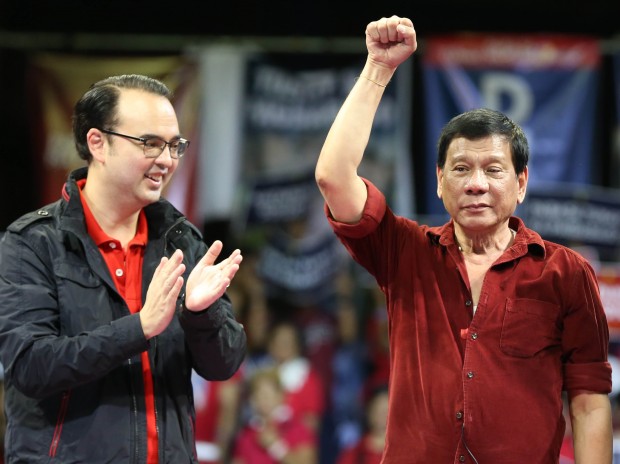Duterte, Cayetano generate most buzz on Facebook

Vice presidential candidate Alan Peter Cayetano and presidential bet Rodrigo Duterte. INQUIRER FILE PHOTO/MARIANNE BERMUDEZ
Already the most talked-about candidate on Facebook, presidential aspirant Davao City mayor Rodrigo Duterte generated more conversations on the social networking site following the release of a video showing him making a remark on the rape-slay case of an Australian missionary more than 26 years ago.
Facebook data showed that Duterte accounted for 68 percent of the conversations from November 20, 2015 to April 20, 2016. Conversations about Duterte peaked on April 17 after a video of him commenting on the rape and murder of Jacqueline Hamill inside the Davao city jail in 1989.
READ: Duterte rape joke on Australian missionary: Too much? | LOOKBACK: The Davao hostage crisis of 1989: Part 1
Duterte was followed by administration bet Mar Roxas with 46 percent, Senator Grace Poe with 42 percent, Vice President Jejomar Binay with 27 percent and Senator Miriam Defensor-Santiago with 19 percent.
READ: Duterte, Cayetano most talked-about bets on Facebook | Duterte, Cayetano generate most Facebook engagements after debate
The five are scheduled to face off on Sunday for the final Commission on Elections (Comelec)-sanctioned presidential debate in Pangasinan.
Among the vice presidential candidates, Duterte’s running mate, Senator Alan Peter Cayetano still generated most buzz with 43 percent. Trailing him were his rivals Senator Ferdinand “Bongbong” Marcos Jr. with 36 percent, Camarines Sur representative Leni Robredo with 35 percent, Senator Francis “Chiz” Escudero with 25 percent, Senator Antonio Trillanes with 19 percent, and Senator Gringo Honasan with 4 percent.
Facebook data showed that in the span of five months, 167 million people, 137 million of whom are in the Philippines, have engaged in 17.9 million conversations about the Philippine elections and the candidates.
It also showed that transparency is the most pertinent issue in the coming elections, driving 69 percent of the conversations. It was followed by economy, education, social welfare, defense and foreign policy, and health. Least discussed were issues on infrastructure, environment and trafficking.
Facebook noted that the percentages add up to more than 100 percent as netizens may discuss more than one candidate. It also clarified that the data it released do not indicate intention to vote and do not measure sentiment.
RELATED VIDEO